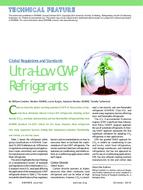Develops a dynamic model of a variable-air-volume (VAV) system. The overall model consists of the following component models. (1) A cooling and dehumidifying coil, (2) a chiller and storage tank arrangement, (3) a single-zone environment, (4) ductwork, and (5) a fan. The control inputs to the VAV system are the supply air mass flow rate, input energy to the chiller, and the fraction of air bypassed. The output variables of interest are zone air temperature and relative humidity. First, open-loop tests are conducted to study the effect of changes in important variables on zone air temperature and relative humidity. Feedback control algorithms are designed for controlling the input energy to the chiller and the position of bypass dampers. The performance of the closed-loop VAV system to step changes in cooling loads is investigated. The results indicate that the control algorithms are able to reject the disturbance effectively. In other words, the zone air temperature and relative humidity are brought close to their respective setpoint values.
KEYWORDS: transient, variable volume air conditioning, calculating, air flow rate, chillers, zones, air temperature, relative humidity, testing, algorithms, controls, energy consumption, dampers, position, performance, cooling load, air conditioning
Citation: ASHRAE Transactions, vol.97, pt. 2, Indianapolis, IN 1991
Product Details
- Published:
- 1991
- File Size:
- 1 file , 1.2 MB
- Product Code(s):
- D-18095


